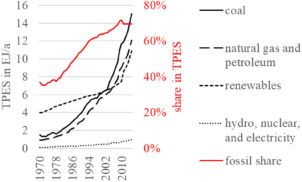
By Brototi Roy and Anke Schaffartzik (Universitat Autònoma de Barcelona)
Abstract
Coal is on the rise in India: despite the devasting impacts of the climate crisis, the awareness for land and forest rights, and political talk of a coal phase-out. In this article, we demonstrate that despite the renewables-led rhetoric, India is in the midst of a transition to (not away from) greater use of coal in its fossil energy system and in the electricity system in particular. We investigate this paradox by combining socio-metabolic and political-ecological analysis of the Indian coal complex. Our framework integrates material and energy flow data as characterizing the Indian fossil energy transition, indicators on the development and structure of the coal industry, and studies of ecological distribution conflicts around coal. The dominant claim to the expansive use of coal and the competing counterclaims are indicative of underlying power relations which can also be witnessed in other countries. In India, they extend into the conflicted development of renewable energy including hydropower, in which the land dispossession, exclusion, and injustices associated with the expansion of the coal complex are reproduced. We conclude that the current energy transition – in which coal continues to play a dominant role – is neither sustainable nor just.
Keywords
Environmental Justice, Just Transitions, Energy Transition, Fossil Energy, Political Ecology.
Link
https://www.sciencedirect.com/science/article/pii/S0921800920303232
How to Cite
Roy, Brototi, and Anke Schaffartzik. 2021. Talk renewables, walk coal: The paradox of India’s energy transition. Ecological Economics 180: 106871.

The project ENVJUSTICE has received funding from the European Research Council (ERC) under the European Union’s Horizon 2020 research and innovation programme (grant agreement No. 695446)